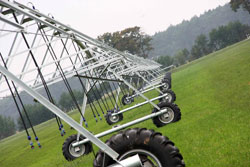Good soil, good harvest

Central pivot irrigations system with radio communicated soil sensor. Picture: Optifert<br>
No rain at all or rainfall which significantly fluctuates is a major problem for farmers, since long periods of drought increase the risk of a poor harvest and make nutrient input difficult. The aim of the “OPTIFERT” research project is to optimize the fertilization and irrigation of agricultural land in Europe by means of intelligent technology. The Optifert system is an integral system that will allow the farmer to optimize the fertilizer supply, reducing the costs and environmental risks of over-fertilization, by means of a closed control loop.
Over 9 million farmers in Europe are obliged to use an irrigation system on their fields. The amount of natural rainfall is often not sufficient to bring home a good harvest. Today, Europe’s farmers are irrigating an area of almost 200.000 km² and this will presumably increase, as the market for irrigation systems is growing rapidly. In the last ten years, the use of such systems rose annually by about 10 percent. Many systems have not however been developed with demand in mind and this often has a devastating impact on the environment: valuable water resources are squandered and fertilizers washed out. Over-fertilization (eutrophication) of land and waters are the result. Sustainable and intelligent solutions are therefore necessary.
It’s the mix that makes the difference: Nutrients and water are important factors for soil quality
Within “OPTIFERT” (http://www.optifert.eu), an EU-funded research project, a consortium led by ttz Bremerhaven is developing a demand-driven, fully automatic and combined irrigation and fertilization system. The partners from Poland, Great Britain, Austria and Germany want to enable farmers to control easily their use of water and fertilizer – in a way which is customized to each specific type of crop. The innovative system reduces water and fertilizer consumption and thus fosters sustainable, efficient and competitive agricultural production in Europe.
Depending on its requirements, the OPTIFERT system currently being developed supplies the crop in real time with water and nutrients: it combines irrigation with just-in-time fertilization. On the basis of various data, the required amounts of water and fertilizer are measured and calculated. This includes data from an innovative soil sensor system (pH, moisture, salinity, fertilizer concentration) as well as meteorological, crop physiology and market data. The OPTIFERT system comprises three main components: the soil sensor, the fertilizer mixing module including dosage system, and the control unit. These allow the system to fulfill efficiently the objective of demand-based fertilization and irrigation.
The “OPTIFERT” research project is being funded under the EU’s Seventh Framework Programme, will last two years and is co-ordinated by ttz Bremerhaven. Project partners are Hydro-Air GmbH, Pessl Instruments (METOS), Integrated Microsystems Austria GmbH, Soil Moisture Sense Ltd., Agrargesellschaft “Niederer Fläming” MBH Petkus, the University of Warmia and Mazury and the Technical University of Vienna. Further information about the project can be found under www.optifert.eu/.
ttz Bremerhaven is an provider of research services and performs application-based research and development. Under the umbrella of ttz Bremerhaven, an international team of experts is working in the areas of food, environment and health. http://www.ttz-bremerhaven.de
Contact:
ttz Bremerhaven
Christian Colmer, Head of Communication and Media
Fischkai 1
D-27572 Bremerhaven
Tel.: +49 (0)471 48 32 -124
Fax: +49 (0)471 48 32 – 129
ccolmer@ttz-bremerhaven.de
http://www.ttz-bremerhaven.de
http://www.facebook.com/ttzBremerhaven
https://twitter.com/ttzBremerhaven
Media Contact
All latest news from the category: Agricultural and Forestry Science
Newest articles

Magnetic tornado is stirring up the haze at Jupiter’s poles
Unusual magnetically driven vortices may be generating Earth-size concentrations of hydrocarbon haze. While Jupiter’s Great Red Spot has been a constant feature of the planet for centuries, University of California,…

Cause of common cancer immunotherapy side effect s
New insights into how checkpoint inhibitors affect the immune system could improve cancer treatment. A multinational collaboration co-led by the Garvan Institute of Medical Research has uncovered a potential explanation…

New tool makes quick health, environmental monitoring possible
University of Wisconsin–Madison biochemists have developed a new, efficient method that may give first responders, environmental monitoring groups, or even you, the ability to quickly detect harmful and health-relevant substances…



